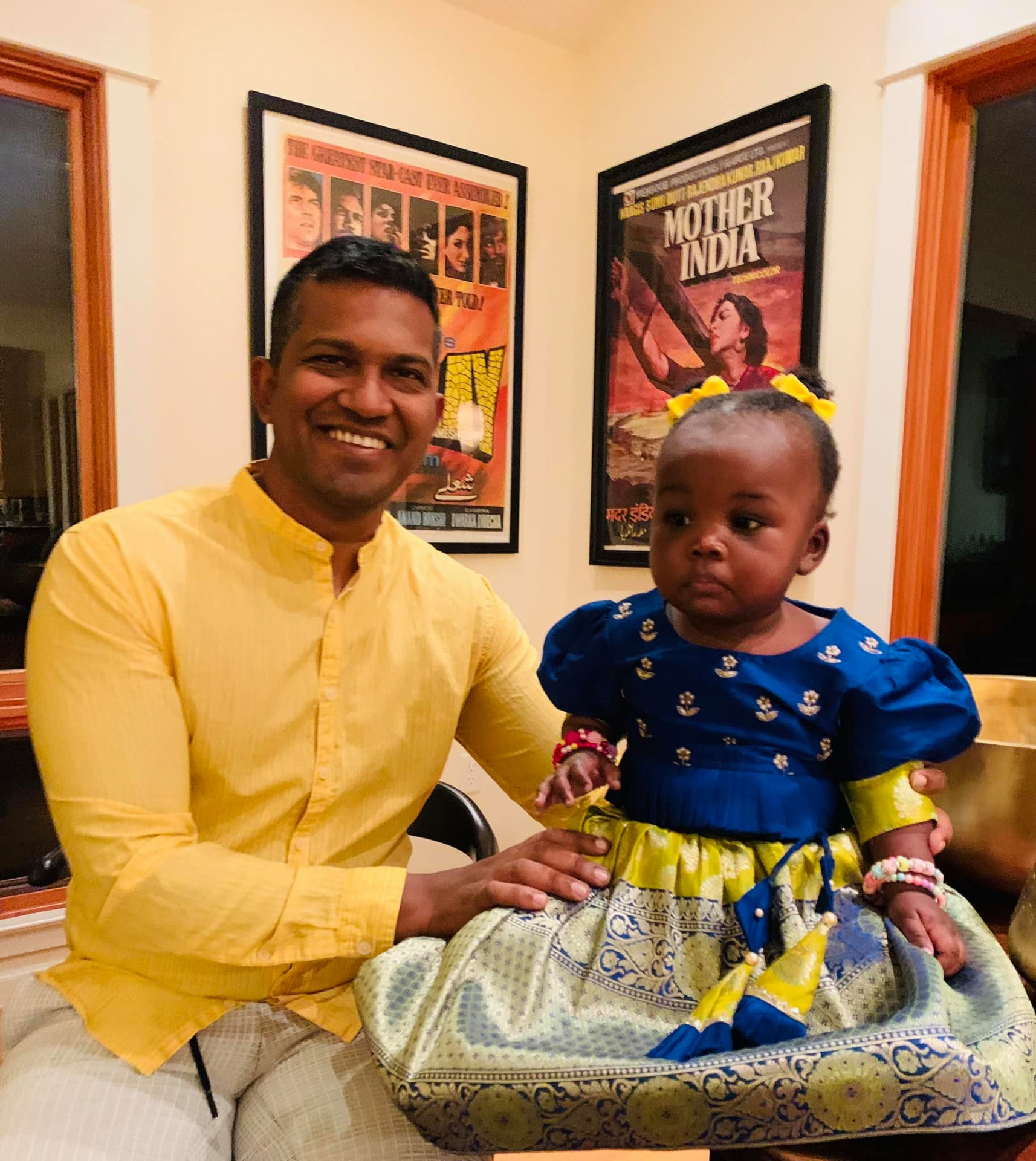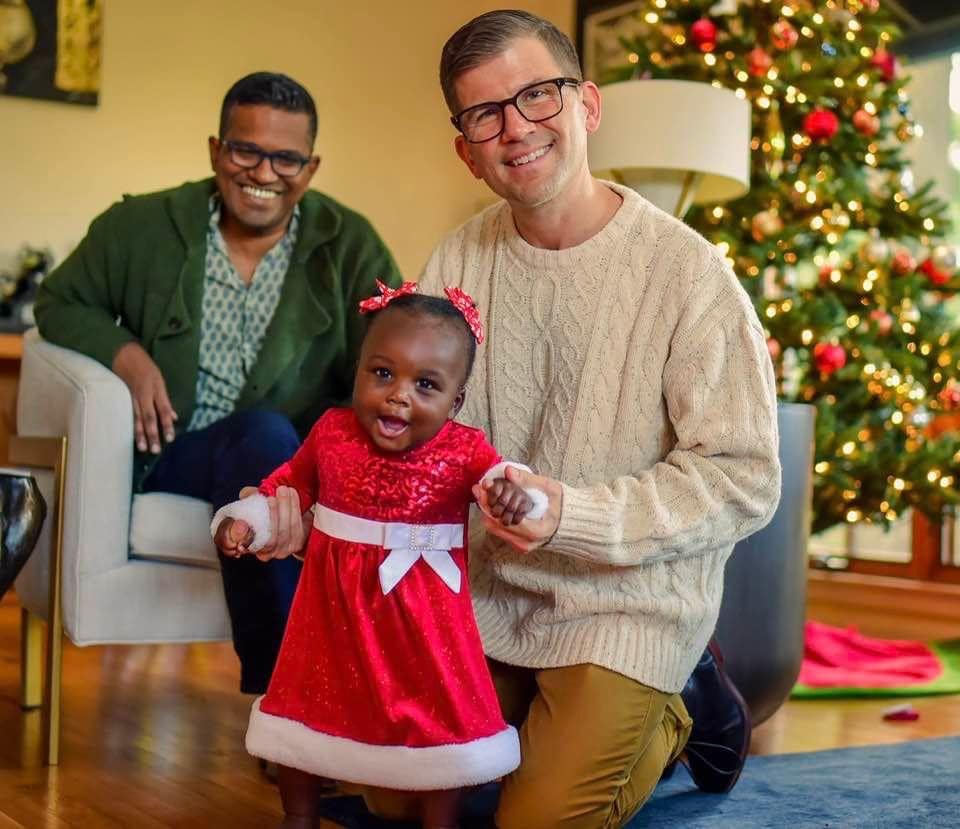Karthik Varatharaj, MBA ’11: Leading With Empathy at Levi Strauss & Co.

As an immigrant and member of the LGBTQ+ community, for Karthik Varatharaj, MBA ’11, the road to personal and professional success was paved with many challenges. Yet it was that journey that helped to inform his inclusive approach to management in human resources.

Today, Varatharaj is vice president and chief talent officer at Levi Strauss & Co. He oversees all aspects of talent and culture, including acquisition, career development, and employee engagement. He’s based in Portland, Oregon, where he lives with his husband David and daughter Aliyya. But both in and out of the office, he strives to advance diversity, equity, and inclusion in all that he does.
Pride and a promise to reach his full potential
In 2004, Varatharaj switched careers from coding to human resources and then landed a job with globally renowned organizational consulting firm Korn Ferry when they opened their first office in Bangalore, India. Outside of work, Varatharaj had built a close-knit community of fellow LGBTQ+ activists and, in 2007, marched with them in a Pride parade.
“It was heady but also scary. Homosexuality was still criminalized. (India still) had colonial laws on the books and they were being used to victimize and harass queer-identifying people,” Varatharaj said. “That was always in the backdrop of my life in India.
“I realized I needed more,” he said. “I didn't want to just keep fighting. I wanted to actually live and thrive and reach my full potential.”
That experience influenced Varatharaj’s future approach to creating inclusive workplaces. It also inspired him to move to the United States to fine-tune his management skills by earning an MBA in a more accepting environment.
‘Ross stood out from other programs’
Of all the MBA programs that the Kuwait-born globe-trotter — who’s lived in more than 10 countries — could have chosen, Varatharaj said the Ross School of Business was his top choice.
“Ross was the perfect academic curriculum for me — management mixed with a focus in areas that I was passionate about, like organizational effectiveness, strategy, and human resources,” he said.
Moreover, Varatharaj admired the Michigan Ross community and culture from the start.
“I wanted something where I could forge close relationships,” he said. “I read about Ann Arbor and I spoke to Ross alumni. The pervasive theme I heard from them was that you make lifelong connections and friends. No matter where you are in the world, for Michigan alumni, people see you. People will go out of their way to support and help you.
“So, on both fronts, Ross stood out from other programs,” he said.
Varatharaj says the groundbreaking research on leading with kindness and compassion that he learned from Center for Positive Organizations professors Jane Dutton and Kim S. Cameron has been a crucial part of his work since graduation.
“I had a great education. I had great teachers. It was all about leaning into that deep, human connection.”
The road to equal rights

After graduation, Varatharaj accepted a leadership and talent consulting job with Korn Ferry in Chicago before moving into a management role in organization transformation and talent solutions with Deloitte in the Windy City.
Chicago is also where Varatharaj met his husband. The pair wed in 2012 but faced a series of hurdles to starting their lives together. Gay marriage wasn’t legal yet in Illinois. Varatharaj’s husband wasn’t allowed to sponsor his green card so he could have permanent U.S. residency. Moreover, the couple couldn’t adopt children.
However, when the Defense of Marriage Act fell in 2013, Varatharaj’s husband was able to sponsor his green card and the couple was free to dream about starting a family. Then, in 2014, a Supreme Court ruling made gay marriage legal in all 50 states, so the couple wed again to make it official.
“Our rights got progressively expanded,” Varatharaj said. “And, in 2018, I became a citizen. It was another amazing moment in my life to be able to fully exercise my rights and pay forward what this country gave to me.”
Leading with empathy
In 2019, Varatharaj was recruited to work with Nike in Portland. He had always loved the brand’s aspirational, values-driven culture and was impressed when they signed NFL free agent and civil rights activist Colin Kaepernick the same year.
“Nike was amazing because I sat in this interesting position where my role straddled talent, culture, and diversity,” Varatharaj said. “I had the opportunity to design programs that helped build a future-forward talent agenda and workforce while ensuring that diversity, equity, and inclusion are at the core of everything we do.”
Varatharaj said the COVID-19 pandemic and protests following George Floyd’s death in 2020 brought a new perspective.
”It was a very humbling and life-changing moment for a lot of us, including me,” Varatharaj said. “I had to rethink everything, including privilege, systemic racism, and how we show up for our employees in a way that demonstrates we care and lead with empathy. That’s a thread that I’ve carried forward into my career at Levi’s.”
Amplifying diversity at Levi’s
Varatharaj started in his current role as vice president and chief talent officer at Levi Strauss & Co. in the fall of 2021. He jumped at the chance to work for the iconic retailer, which has stood on the right side of history — integrating its factories in 1950s Virginia in defiance of local ordinances, pioneering same-sex partner benefits in the 1980s at the height of the AIDS epidemic, and recently making a public statement in defense of reproductive rights.
Varatharaj’s goal is to strengthen Levi’s position as a world-class destination for talent by hiring the best and from the most underrepresented talent pools, unlocking growth and career potential through best-in-class development programs and fostering a culture that promotes high performance, equity, and belonging.
His team focuses on amplifying diversity and representation through partnerships with emerging Black designers, as well as the company’s campus programs and early career pipeline. The company believes in making big bets on early career and high-potential talent and putting them in critical jobs where they can drive huge impact and get promoted faster into more senior roles. The goal is to reach gender parity at the executive level and have BIPOC representation in the company that reflects Levi’s community and consumers.
Varatharaj has kept the promise he made to himself when he left India for the United States to attend business school and reach his full potential. Now, he pays it forward by ensuring other people from all backgrounds and identities are able to thrive and reach their full potential, too.







